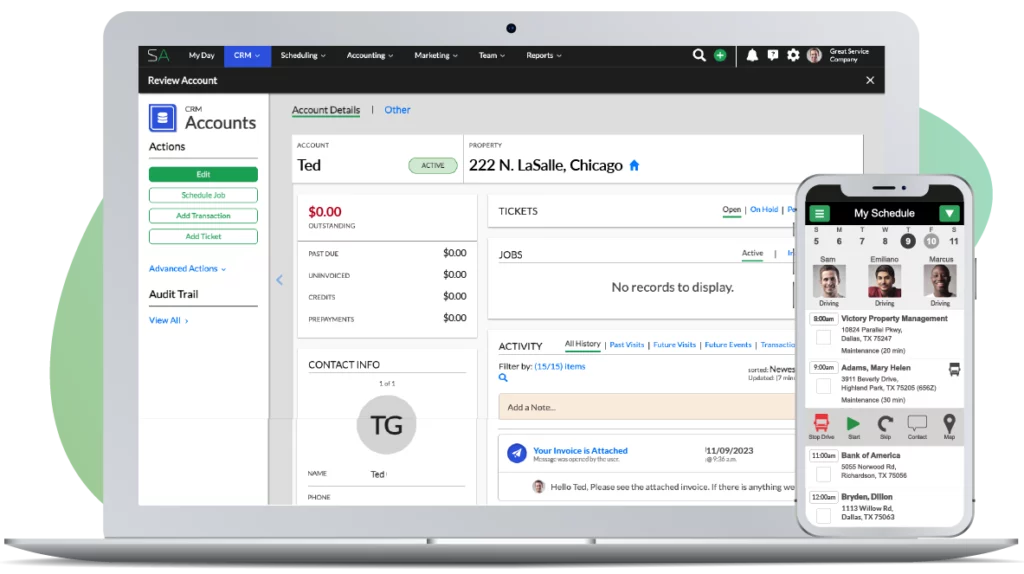Transcript of Video:
The question is… I’ve heard you say that you do not like discounting but a lot of customers and leads ask for discounts. What should I do?
So that’s true, I am not fond of discounting and I actually think it sets a bad precedent. I also find at both my lawn care company and Service Autopilot my software company that clients or perspective clients that ask for discounts tend to not be our better clients. For example, at Service Autopilot, we get a lot … we get some, not a lot, we get some people that will ask us to waive what is a very small getting started fee, because we put a lot of work into helping them get up and running or they’ll ask us to waive the first month so they can try it for free even though we have a 30 day guarantee where they can get all their money back.
What we find is that when we … for those that say, “Well I’m not really willing to pay even 70 bucks upfront, I want to try it for free for a month and then I’ll decide after that.” By measuring it and watching it, we found those clients or perspective clients do not turn up to be very good. Some do, but most don’t. They’re not that serious about it and so we find … in our experience, and we pay attention to this, that the best clients are not asking for discounts, the best clients are not trying to negotiate over $70. The best clients are committed and so that act a little bit different.
In the lawn care company, we’ve seen exactly the same thing. The person that asks for a discount or will only do business with you if you give them a discount or basically it comes at you in an aggressive faction and says “The only way I’m going to do business with you is you must do this.” That is not the way to start a relationship with us and it’s probably not the best way to start a relationship with you. When you … and there probably are some great clients that if you did negotiate with them, they may turn out to be great clients, but the problem is you’re playing the odds, you’re playing the percentages and most are not. We find that a client that comes towards to us in an aggressive fashion, wanting to do business with us, but in a sense that’s kind of threatening us and that they’re saying ”We won’t do business with you unless you do this for me,” that does not make for a good relationship.
As far as I’m concerned, the way I look and the way I would recommend you to look at it is I am not in business to take everyone as a client. There are good clients and there are bad clients and you want good clients, you want to build a company where the people you’re working with, both of course the employees, but also the clients are clients that you like, that you … that they also look at the business transaction as a back and forth … in a sense of negotiation where you’re bringing value to the table and they’re bringing value to the table as well in the form of paying you and money and if it’s lopsided on either side, that’s not a good business transaction, that’s a not a good relationship.
If somebody comes to me aggressive or they have an attitude or they are demanding in the sense that “We don’t like the way you do things and we’re only going to pay you this amount of money and take it or leave it or we won’t be your client, we’ll go somewhere else,” that’s not a good 2 way relationship for us and building a business with a lot of clients that do that to you and take that attitude will not allow you to build a company that you like and would like to keep for 10 or 15 years or 20 years or however long you intend to do this.
There’s more to it than even money. It’s also about making sure you don’t load your company with a bunch of clients that are going to drive you crazy. I’m very particular about that. If we get calls or messages from client that take a very aggressive approach with us or tell us that they will only do business if we give them a discount or they don’t like the way we do something, we … we do not try to them as a client and I am very, very strong on that. Not everyone is a good client and there’s so much business you don’t need everyone as a client.
Discounting could be your first sign. If somebody is saying “You must discount this for me to do business with you,” that could be a sign. If you’re doing discounting, start to pay really close attention to how the clients that you give discounts to work out.
A couple more examples. 1, at our lawn care company, when we switched over and only worked with clients that would pay with their credit card, [‘with other’ 00:04:41] charge their credit card for work performed. Every once in a while, we would make some exceptions and it seems like every single time we make an exception, again, every single time is an over generalization. Let’s say 80% of the time, when we make an exception, we look back and we say we knew better, we shouldn’t have done it, there’s a reason why we have this deal, even with people that are maybe seniors, that they’ll have credit cards, even with those maybe that were the military and you had a spouse that was home by herself and her husband was off in the military and so we made an exception trying to help them or help an older couple, it’s over and over again. Some percentage of the time we still pay the price for breaking the rule that we had about only working with people that pay with credit card.
I see these little trends and once discounting, one is how they pay you, one is making exceptions in the business for a few clients here or there, that don’t like the way you do things. I’d be very, very aware of that.
The other thing that discounting does is if you start the relationship and you … and they say “I need this for free or in need a discount,” then you have undervalued what you are selling. For example, when I set prices, both at service auto pilot and at my lawn care company, those prices are set very intentionally. We have a strategy around pricing and if the pricing is high, then there’s a strategy around that. If pricing is a little low right now, for whatever reason, there’s a strategy around that. I didn’t just pick the pricing out of the air and you don’t want to just pick your pricing out of the air, there should be a strategy. If you have a strategy and you’re pricing for a certain reason because you want to make a certain amount of money, well then, when you discount it, you’re going against your plan and you will not be hitting your goals. How does that make sense? If you start that relationship and give a discount, you are communicating to that individual, non-verbally that “You know what? I overpriced this because I have plenty of room to give you a discount and do it the way you want me to do it” and they met not think about it quite that way, but you’ve just communicated that and so in future transactions, in future deals with that clients, why shouldn’t they expect they can ask for and get a discount at any time.
There might be reasons to make an exception here or there, but it’s a precedent that you’re setting when you discount and also when you come … when you work with someone that comes at you in an aggressive tone and say “You must do it this way if I’m going to do business with you,” well, you should expect that if they win that, if you take them on as a client, you should expect that they’re going to continue to do that. It works, you’ve encouraged that behavior.
Those are a few thoughts about and again, I want to … I want to say that because somebody wants to negotiate or ask for discount, does not mean they’re a bad client. In anyway, I mean, as a … we negotiate with other and we ask for discount sometimes, but I think the tone and the way they handle it is extremely important and anyone that threatens you and just is really harsh about it, I think that’s a bad sign. I do think discounting is a problem.
The final thing I’ll end with this, incentives work. If you look at marketing, one of the things you want to do in marketing is give a reason, a call to action and a compelling offer that gets your prospector leave to move and take action right now. Just telling the prospective client that “Hey, if you’ll do business with me at my pricing by 5:00 today, that would be great.” What’s that? Who cares? I mean I could do business with you tomorrow at 5:00 or next Wednesday if I … 5:00 was actually irrelevant, that was only for today, but I can do business with you today, tomorrow, next week. There’s no reason for me to do it today, so incentives work.
Discounts are a form of incentives, I just don’t like discounts for the reason I said. If you’re trying to get someone to take action, what is that you can do instead of discounting a bonus or something, some kind of little extra and be careful with throwing in a lot of free stuff because your free service work, because your … again, your devaluing your time and you’re devaluing your pricing, but these are a bonus that you can have. It’s a little removed from the service you offer. For example, if I was running a marketing campaign, instead of saying I’ll give you a free mowing or I’ll do a free fertilization week control or I’ll give you 10% off your bill. Maybe, instead, I would give the equivalent value in the form of a free iPod. I’ll give you an iPod if you sign up by Wednesday the 15th at 5 P.M. That is a reason to take action. It’s an incentive, but instead of devaluing your service, instead of throwing in free service which sets the precedent later, you’ve given a different type of value.
Actually, a lot of types things like iPod and stuff like that actually works better than giving some free … some discounting anyway because the discounting doesn’t even feel … after … when they get the bill in the mail, they don’t even really notice the discount, it doesn’t really feel like they got something. Whereas when they have an iPod or some other thing that they can use unrelated to your service, that feels like they got something that they might not have went out and bought on their own.
I went a little off topic, but it does apply into discounting that there are reasons to discount, there are reasons to give incentives, but maybe there’s a better way, there’s a better approach.
The take aways are just what I said there and then the other take away that’s really critically important is be very aware of how the prospect is approaching you in this negotiation, asking you to do business and if it’s … if you feel that that prospect is not going to be a good client because of the way they are handling the situation, I would recommend against incentives or discounts in that case and not even try that hard to win the business.
In the alternatives where you really want the client, don’t be a great client, but they’re just looking for something trying to feel like they’re getting a little something out of the deal, some kind of an incentive or discount, what can you do other than discounting price to make that transaction happen and make that deal happen?



